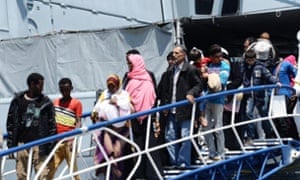The number of migrants to have arrived in Italy by boat this year passed 50,000 at the weekend as over 5,800 people were rescued in the Mediterranean.
A total of 3,480 people were rescued on Saturday from 15 separate boats that set off from Libya, and more rescues were ongoing on Sunday. The international effort involved the Italian authorities and naval ships from the UK, Ireland and Germany.
It has been one of the busiest weekends so far this year for rescues in the Mediterranean, the start of an uptick over the summer months as people-smugglers take advantage of calm seas.
As of Thursday the Italian interior ministry had registered 48,905 arrivals, meaning the total for 2015 is now above 50,000.
The Royal Navy’s HMS Bulwark was brought in on Sunday to save more than 1,000 migrants in seven separate operations, including at least 10 pregnant women.
Nick Cooke-Priest, the ship’s captain, said it had been an “intense, complex day” and praised the work of helicopter crews sent out to locate migrant boats. The series of rescues was the HMS Bulwark’s largest to date since being sent to the Mediterranean by the UK government on 4 May.
A second British warship, HMS Protector, was also involved in rescue operations on Sunday as part of the EU’s Triton sea rescue operation. The Maltese, Spanish and Swedish navies also took part in rescues on Sunday alongside the Italian coastguard and private vessels.
Around 2,200 of the migrants were first picked up by rescuers from the Migrant Offshore Aid Station (MOAS), an independent Maltese operation supported by the medical charity Médecins Sans Frontières (MSF).
Ian Ruggier, who recently retired after 26 years in the Maltese army, said being part of MOAS rescues went beyond his expectations. “I’ve never come across anything of this sort, for a moment it looked like a military exercise. We were expecting contact but not of that magnitude,” he said from the MOAS ship MY Phoenix.
Those saved began to disembark in Sicilian ports on Sunday evening, with further landings expected in the toe of Italy’s boot on Monday.
Despite the high volume of barely seaworthy boats leaving Libya, there were no reported shipwrecks over the weekend. Federico Fossi, a spokesman for the UNHCR, put migrants’ safe passage down to increased EU rescue efforts.
“Triton is working well, it’s a big effort and we have to recognised that,” he said. “The most important thing is that they now go into Libya waters, where the majority of accidents happened in the past.”
Fossi said the current situation marked a big improvement since April, when 800 people drowned in a single shipwreck. The tragedy prompted EU countries to commit greater support for Triton, tripling its monthly funding to €9m (£6.5m) and agreeing to expand the operation’s patrol area.
The deaths of around 1,800 people in the Mediterranean so far this year has also led to increasing discussion of how best to stem the flow of migrants from North Africa.
The UK prime minister, David Cameron, has asked his officials to see if more of the country’s aid budget can be urgently redirected to countries bordering Libya. Cameron has asked Justine Greening, the international development secretary, to see if aid to these governments could help stem the flow could stop the cycle of drawings and rescues.
The effective collapse of the Libyan government and consequent power vacuum has led to a flow of economic migrants from other countries into Libya and then onto boats bound for Europe.
The vast majority of migrants arriving in Italy are not originally from Libya itself but come from countries further afield, including Mali and Nigeria, while significant numbers have also travelled from Eritrea and Syria.
Cameron’s proposal is modelled on the Spanish response to the flow of refugees to the Canary Islands from west Africa. The Spanish government acted as a partner with West African countries to help stop criminal gangs, easing the migratory flows.
European governments have additionally sought UN approval to take military action against people-smugglers operating out of Libya, while also outlining plans to relocate 40,000 refugees from Italy and Greece to elsewhere in Europe over the next two years.
Although welcomed by the Italian government, the proposals have done little to deter the anti-immigrant rhetoric of the country’s rising far right. Northern League made gains in local elections after campaigning against the migrant “invasion”.
The case for helping new arrivals received a further blow this month after a junior minister was put under investigation over alleged contract-rigging at the Mineo migrant centre in Sicily.
Giuseppe Castiglione, undersecretary for agriculture, has denied being involved in the “Mafia Capitale” scandal, after investigations revealed that criminal organisations had infiltrated the state-run immigration system. Italy’s prime minister, Matteo Renzi, is under growing pressure after refusing to call for Castiglione’s resignation.
*************************************************************
